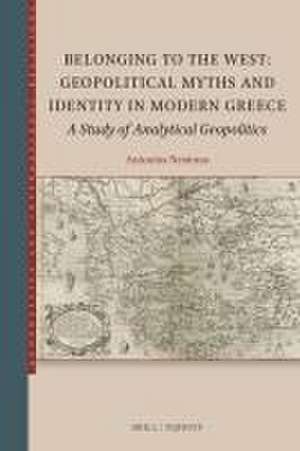Belonging to the West: Geopolitical Myths and Identity in Modern Greece: A Study of Analytical Geopolitics: Geopolitics and International Relations, cartea 3
Autor Antonios Nestorasen Limba Engleză Hardback – 12 noi 2023
Preț: 547.76 lei
Preț vechi: 668.01 lei
-18% Nou
Puncte Express: 822
Preț estimativ în valută:
104.81€ • 109.43$ • 86.75£
104.81€ • 109.43$ • 86.75£
Carte indisponibilă temporar
Doresc să fiu notificat când acest titlu va fi disponibil:
Se trimite...
Preluare comenzi: 021 569.72.76
Specificații
ISBN-13: 9789004686892
ISBN-10: 9004686894
Pagini: 266
Dimensiuni: 155 x 235 mm
Greutate: 0 kg
Editura: Brill
Colecția Brill | Nijhoff
Seria Geopolitics and International Relations
ISBN-10: 9004686894
Pagini: 266
Dimensiuni: 155 x 235 mm
Greutate: 0 kg
Editura: Brill
Colecția Brill | Nijhoff
Seria Geopolitics and International Relations
Notă biografică
Antonios Nestoras, Ph.D. (1983), is an Adjunct Professor at the Brussels School of Governance, Vrije Universiteit Brussel (VUB). He also acts as Deputy Executive Director of the European Liberal Forum (ELF), Editor of ELF's Technopolitics Series, Chief Editor of the Future Europe journal, and a curator of the podcast Liberal Reads.
Cuprins
List of Maps and Tables
1 Introduction
1 Explanations Based on Interests and Identity
2 The Constitutive Role of Political Myth and Geography
3 Political Myth and Geopolitical Analysis
2 A Short History of Geopolitics
1 From Classical to Critical Geopolitics
1.1 Classical Geopolitics, Rise and Demise
1.2 Geopolitics’ Revival and Critique
1.3 Postmodern, Critical Geopolitics
1.4 Textual Deconstruction in Critical Geopolitics
1.5 The Critique of Critical Geopolitics
2 From Critical to Analytical Geopolitics
2.1 Myth and Political Myth
2.2 Political Myth, ir, and Geopolitics
2.3 Toward an Analytical Geopolitics
3 A Structural-Historical Method of Analysis
3.1 Geopolitical Myths as Structural Objects
3.2 Types and Form of Geopolitical Myths
3.3 The Functions of Geopolitical Myths
3 Geopolitical Mythmaking in Modern Greece
1 Excursus: Locating “Greece” in Space and Time
2 Imitating the West and the Greek Enlightenment
2.1 The Great Idea as a Foundational Geopolitical Myth
2.2 Modern Times, Modern Space: Enlightenment, Science, and Geography
2.3 Centrality, Continuity, and Affinity in Greek Political Geography
2.4 Interim Conclusion: The Diffusion of Belonging
3 Opposing the West and Greek Romanticism
3.1 Absolutism, Religion, and the Russian Expectation
3.2 Romantic Historiography and the Byzantine Revival
3.3 Western Dependence and the Limits of Opposition
3.4 Interim Conclusion: Opposition and Adaptation of Belonging
4 Belonging to the West and European Integration
4.1 Western Dependence from the Turn of the Century to World War II
4.2 Belonging to the West from the Civil War to European Integration
4.3 Europeanization, Modernization, and the Geopolitics of the Euro Crisis
4.4 Interim Conclusion: Ritualization and Sacralization of Belonging
4 Conclusions
1 Belonging to the West as a Geopolitical Myth
2 The Making of an Efficient Geopolitical Myth
3 Analytical Geopolitics: A Research Agenda
References
Index
1 Introduction
1 Explanations Based on Interests and Identity
2 The Constitutive Role of Political Myth and Geography
3 Political Myth and Geopolitical Analysis
2 A Short History of Geopolitics
1 From Classical to Critical Geopolitics
1.1 Classical Geopolitics, Rise and Demise
1.2 Geopolitics’ Revival and Critique
1.3 Postmodern, Critical Geopolitics
1.4 Textual Deconstruction in Critical Geopolitics
1.5 The Critique of Critical Geopolitics
2 From Critical to Analytical Geopolitics
2.1 Myth and Political Myth
2.2 Political Myth, ir, and Geopolitics
2.3 Toward an Analytical Geopolitics
3 A Structural-Historical Method of Analysis
3.1 Geopolitical Myths as Structural Objects
3.2 Types and Form of Geopolitical Myths
3.3 The Functions of Geopolitical Myths
3 Geopolitical Mythmaking in Modern Greece
1 Excursus: Locating “Greece” in Space and Time
2 Imitating the West and the Greek Enlightenment
2.1 The Great Idea as a Foundational Geopolitical Myth
2.2 Modern Times, Modern Space: Enlightenment, Science, and Geography
2.3 Centrality, Continuity, and Affinity in Greek Political Geography
2.4 Interim Conclusion: The Diffusion of Belonging
3 Opposing the West and Greek Romanticism
3.1 Absolutism, Religion, and the Russian Expectation
3.2 Romantic Historiography and the Byzantine Revival
3.3 Western Dependence and the Limits of Opposition
3.4 Interim Conclusion: Opposition and Adaptation of Belonging
4 Belonging to the West and European Integration
4.1 Western Dependence from the Turn of the Century to World War II
4.2 Belonging to the West from the Civil War to European Integration
4.3 Europeanization, Modernization, and the Geopolitics of the Euro Crisis
4.4 Interim Conclusion: Ritualization and Sacralization of Belonging
4 Conclusions
1 Belonging to the West as a Geopolitical Myth
2 The Making of an Efficient Geopolitical Myth
3 Analytical Geopolitics: A Research Agenda
References
Index


